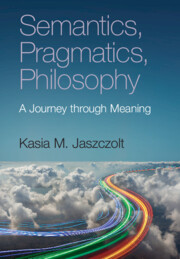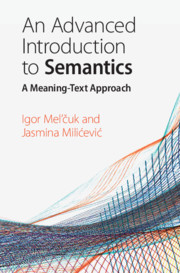Semantics, Pragmatics, Philosophy
A Journey through Meaning
£27.99
- Author: Kasia M. Jaszczolt, University of Cambridge
- Date Published: March 2023
- availability: In stock
- format: Paperback
- isbn: 9781108731041
£
27.99
Paperback
-
Semantics and pragmatics – the study of meaning, and meaning in context, respectively – are two fundamental areas of linguistics, and as such are crucial to our understanding of how meaning is created. However, their theoretical ideas are often introduced without making clear connections between views, theories, and problems. This pioneering volume is both a textbook and a research guide, taking the reader on a journey through language and ultimately enabling them to think about meaning as linguists and philosophers would. Assuming no prior knowledge of linguistics, it introduces semantics, pragmatics, and the philosophy of language, showing how all three fields can address the 'big questions' that run through the study of meaning. It covers key theories and approaches, while also enabling increasingly more sophisticated questions about the interconnected aspects of meaning, with the end goal of preparing the reader to make their own, original contributions to ideas about meaning.
Read more- Offers a unique combination of semantics, pragmatics, and philosophy in one volume and shows how understanding their interaction is essential for understanding meaning in language
- Combines aspects of a comprehensive textbook with a research guide to help the reader develop their own stance on meaning in language
- Contains clear overviews of all concepts and theories, but also progresses to philosophical questions at every stage, helping to develop a critical attitude to the theories and views introduced and discussed in the book
Reviews & endorsements
'… the book is incredibly lucid and clear, and it is a fantastic resource for researchers and Ph.D. students.' Fabrizio Macagno, Journal of Pragmatics
Customer reviews
Not yet reviewed
Be the first to review
Review was not posted due to profanity
×Product details
- Date Published: March 2023
- format: Paperback
- isbn: 9781108731041
- length: 438 pages
- dimensions: 245 x 171 x 20 mm
- weight: 0.85kg
- availability: In stock
Table of Contents
Preface and tips on how to read this book
Acknowledgements
List of abbreviations and symbols
Stage 1. Introduction: meaning – what it is and where to find it:
1.1 How (not) to study meaning
1.2 Semantics, pragmatics, and philosophy (and why they are best done together)
1.3 Proposition: a flexible unit for studying meaning?
1.4 Meaning and its correlates
Stage 2. word meaning and concepts:
2.1 Harnessing word meaning
2.2 The 'concept' commotion
2.3 Language and thought
2.4 Lexicon and pragmatics
2.5 The role of reference
Stage 3. Composing sentence meaning: tools and their purpose:
3.1 Truth in service of meaning: truth conditions and truth-value judgements
3.2 The metalanguage for the logical form
3.3 Possible worlds and models
3.4 Semantic composition and semantic types
3.5 Type-theoretic metalanguage and lambda abstraction
3.6 Formal tools and cognitive reality
Stage 4. Operations on sentences:
4.1 Sentential connectives and propositional logic
4.2 Conjunction
4.3 Disjunction
4.4 Conditional and biconditional
4.5 Negation
4.6 Linguistic diversity: snakes and ladders, cluedo, and monopoly
Stage 5. Inside the sentence:
5.1 Limitations of the metalanguage
5.2 Quantification
5.3 Representing time
5.4 Modality
5.5 Propositional attitude reports
5.6 Interim conclusions: semantic tools for formal cognitive representations?
Stage 6. Conveying information:
6.1 From sentences to discourses: dynamic semantics for dynamic meaning
6.2 Referring and its tools
6.3 Organizing information in discourse
Stage 7. Utterance meaning, or what lurks under the surface:
7.1 Saying, implicating and inferring
7.2. Truth-conditional vs. non-truth-conditional, semantic vs. pragmatic: what to include and what to leave out
7.3 Keeping semantics and pragmatics apart
Stage 8. Meaning in service of its makers:
8.1 Who needs literal meanings?
8.2 What makes a metaphor
8.3. Speech and action
8.4 At a crossroads with ethical and social debates
Stage 9. Conclusion: the future of meaning?
Index.
Sorry, this resource is locked
Please register or sign in to request access. If you are having problems accessing these resources please email [email protected]
Register Sign in» Proceed
You are now leaving the Cambridge University Press website. Your eBook purchase and download will be completed by our partner www.ebooks.com. Please see the permission section of the www.ebooks.com catalogue page for details of the print & copy limits on our eBooks.
Continue ×Are you sure you want to delete your account?
This cannot be undone.
Thank you for your feedback which will help us improve our service.
If you requested a response, we will make sure to get back to you shortly.
×


